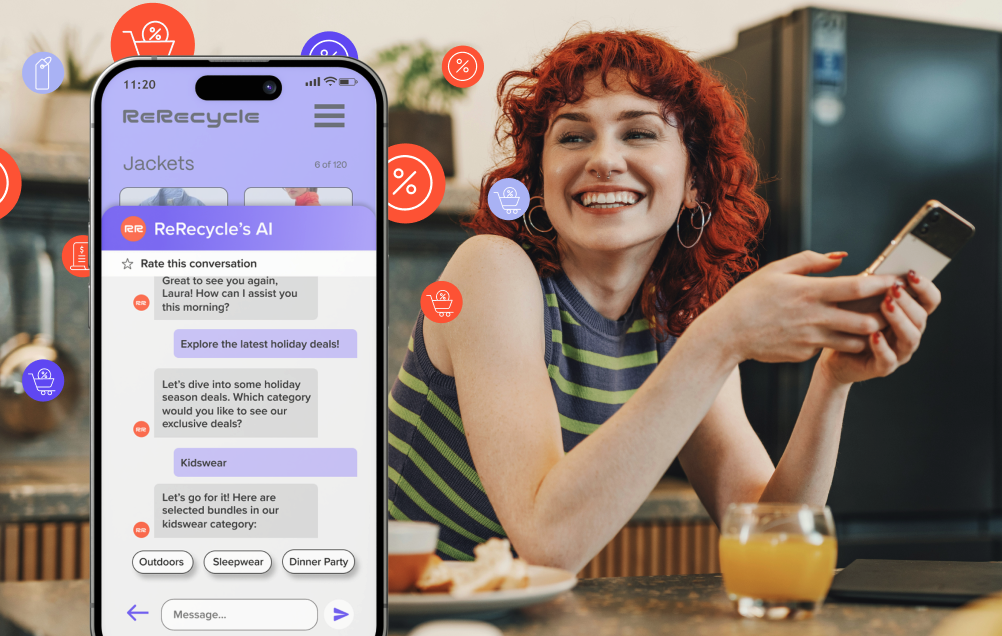How Can AI-Powered E-Commerce Increase Sales for Online Merchants?
Artificial intelligence (AI) is leading a paradigm shift in the business functions of companies across industries. With the total size of the AI market expected to grow to $1.8 trillion by 2030, it’s no surprise that the technology is also making a huge impact on e-commerce. From enhancing customer experience to fortifying security protocols, AI allows online merchants to implement new features while operating their business with greater efficiency.
Understanding the Use of AI In E-Commerce
When you think about e-commerce AI, chatbots and support tools likely come to mind first. Speedy customer service is an expectation. Apps powered by AI are the most efficient at providing such, especially if you can’t hire a large support team to work around the clock.
While the most prominent AI use case has traditionally been support, there are other ways it can play a substantial role in helping e-commerce companies. AI can handle complex functions, automate repetitive tasks, and provide insights where they may otherwise not be available. Below, are some of the most relevant e-commerce use cases for AI:
- Shopping assistants: AI tools for engaging shoppers, assisting with finding products, and handling sales functions.
- Inventory management: Learning algorithms to assist with operations such as demand forecasting and stock notifications.
- SEO tools: AI that automates SEO tasks and scans for SEO friendliness.
- Imagery and videos: AI tools to auto-generate and process large volumes of image and video assets.
- Voice assistants: Apps that provide speech-based shopping assistance, which many shoppers prefer.
- Security: AI for assisting with fraud detection and prevention.
Examples of Popular E-Commerce AI Applications
As AI becomes more common, many e-commerce platforms have added native AI features to their core functionality. This can be seen with Shopify’s Magic tool which offers instant guidance and step-by-step directions for using the platform. Additionally, many third-party apps offer deeper AI functionality for a specific area. The most impactful tools are user-friendly and integrate seamlessly with other technology. Let’s examine some popular AI applications designed specifically for Shopify e-commerce sites:
1. CreatorKit
CreatorKit is an AI product photo and video creator that uses generative AI to greatly enhance the speed at which you can add high-quality imagery to your shop. With the app, you can provide a brand kit to generate hundreds of visual assets automatically. There is also a background remover tool that uses AI to apply new backgrounds for your catalog images instantly.
2. Minta
Minta is an AI social media app that you can use for ad creatives and automating social posts. The automation works for Pinterest, Facebook, Instagram, and TikTok to let you easily turn your store’s data into attractive social content. The app also integrates with Reconvert to provide dozens of ready-made templates, catered to different platforms.
3. GoWise: AI Product Description
GoWise AI Product Description is an AI SEO optimizer and product description generator that you can use to streamline your product listing processes. The AI generates multiple descriptions for each product, ensuring they are unique and SEO-optimized. There is also a bulk editor feature that lets you rapidly produce descriptions for multiple items at once.
4. Rapid AI Search Bar & Filter
Rapid AI Search Bar & Filter is an AI search feature that uses smart recommendations to improve your site’s product discovery. The app helps visitors easily find what they’re looking for with an AI-powered algorithm and customizable tags and filters. Plus, there is an autocomplete feature that provides helpful search complete suggestions.
Impactful Ways That AI Can Assist In Growing E-commerce Sales
While there are many ways to use AI for e-commerce, leveraging artificial intelligence as a sales assistant, can be one of the most beneficial. Selling online allows you to offer a vast array of products. However, it can also make it more difficult for customers to find what they need. Large catalogs, multiple variants, and different price points add complexity to the purchase journey.
AI sales assistants help alleviate this problem. Using advanced algorithms they simplify choices by presenting buyers with the most relevant information. Below, are a few of the most substantial ways AI assistants can directly impact sales.
1. Intuitive Engagement for Increased Conversion Rates
.gif)
AI Shopping assistants level up the outdated online buying experience. Before AI there weren’t many good choices for engaging site visitors. Your options were to set up a simple button or rules-based bot that couldn't handle complex situations and presented a generic experience to each visitor. Alternatively, you could have your staff operate a live chat, which is costly and resource-intensive.
However, with conversational AI, you can create an engaging experience by implementing a chat that interacts with users in an intuitive and personalized manner. This can be seen with Rep AI’s guided shopping functionality which has proven to enhance shopping experiences, leading to better engagement metrics and conversion rates.
For example, when Harney and Sons needed a robust tool to engage site visitors, they decided Rep AI was the best choice due to its right-time engagement capability and strong product discovery features. As a result, the company experienced a +20% AI-assisted conversion rate, which helped boost overall conversion by 2.5X before using the AI.
2. Intelligent Recommendations for Higher Average Order Values
By automating and streamlining sales processes, AI helps to drive higher order values. It does so by giving merchants more efficient means of presenting upsells and complementary items. AI also uses personalization to maximum effect. Through analyzing browsing patterns and purchase history AI can optimize its sales messaging and recommendations for each shopper.
For example, Rep AI's behavioral analytics and capacity for continual learning let it intelligently recommend products while also suggesting complementary offers to increase order values. The impact is visible with the jewelry brand Eat. Read. Love. who leveraged the ability to add intelligent promotions into the chat experience to drive a $30 increase in AOV a month after implementing AI.
3. Data-Driven Decision Making for Continual Improvement
The extensive data afforded by an AI sales assistant differs from that collected from other e-commerce solutions. Other platforms can provide browsing data and some conversion metrics. However, they lack the conversational details that you get with an AI shopping assistant. These insights are invaluable as they provide new perspectives into your audience’s interests and experiences.
For example, with Rep AI’s analytics, you can see which types of visitor conversations led to sales, and how these metrics compare to your store’s overall performance. Furthermore, with the visitor drop-off feature, you can diagnose your conversion blockers by seeing exactly why visitors leave your store without buying.

Final Thoughts
AI-powered e-commerce tools help you create better customer experiences while saving valuable time to focus on the actions most impactful to your business. With such widespread application, it wouldn’t be a shock to see the top solutions in all functional areas of the e-commerce tech stack using AI soon. This makes now the ideal time to familiarize yourself with this growing technology.
Get started with a 30-day free trial of Rep AI to see the substantial impact AI can yield for your e-commerce business.
Quick Answers and FAQs
In what ways do conversational commerce and natural language processing improve customer engagement in e-commerce?
Conversational commerce, powered by natural language processing (NLP), creates shopping experiences that feel personal, intuitive, and human. Instead of forcing customers to navigate menus and search pages, AI-powered chatbots and voice assistants engage shoppers in real conversations—leading to deeper connections and increased engagement.
Scenario: The Customer Wants Personalized Recommendations
Instead of browsing through endless product categories, customers can ask for what they need in plain language.
Solution: AI chatbots use NLP to understand the request, analyze browsing behavior and purchase history, and deliver tailored product suggestions instantly.
Benefit: Shoppers get relevant options without the hassle—making them more likely to purchase and return.
Scenario: Questions Slow Down the Buying Process
Confusion about product details or delivery options can lead to hesitation—or worse, cart abandonment.
Solution: Conversational AI answers questions in real time, offering accurate, contextual information that clears up uncertainty.
Benefit: Customers make informed decisions faster, reducing friction and increasing conversion rates.
Scenario: Complex Purchases Feel Overwhelming
Comparing features and finding the best option often requires time and effort.
Solution: NLP allows chatbots to guide shoppers through complex product comparisons using natural conversation, breaking down specs in an easy-to-understand way.
Benefit: Customers feel more confident in their choices, boosting satisfaction and reducing returns.
Scenario: Passive Browsing Leads to Missed Opportunities
Shoppers who browse without assistance may leave without buying.
Solution: Conversational commerce engages customers proactively, offering help, suggestions, and personalized promotions based on browsing behavior and cart contents.
Benefit: Engagement increases in the moment, leading to higher order values and more completed purchases.
How do personalized product recommendations and search personalization contribute to increasing average order value?
Personalized product recommendations and search personalization play a key role in increasing average order value (AOV) in e-commerce. By presenting shoppers with relevant, higher-value items and complementary products, businesses can encourage customers to add more to their carts—without feeling pushy. The goal is simple: create an experience that’s helpful, intuitive, and tailored to the customer’s needs.
The Challenge
Shoppers often come to an online store with a specific product in mind. Without personalized guidance, they may leave after buying only what they originally planned to purchase—or not buy at all.
The Approach
AI-driven personalization steps in at key moments during the shopping journey. It analyzes browsing behavior, purchase history, and product relationships to recommend items customers are most likely to find valuable. This happens through:
- Upselling Premium Options
Offering higher-quality alternatives when customers are considering standard products, along with clear benefits that justify the investment.
- Cross-Selling Complementary Products
Suggesting items that naturally go with what’s already in the cart—like accessories, add-ons, or bundles that solve additional needs.
- Optimized Search Personalization
Prioritizing higher-value and complementary items in search results, helping customers discover more premium offerings with minimal effort.
The Impact
Personalized recommendations and search optimization guide customers toward larger, more valuable purchases. And because suggestions are relevant and timely, they feel helpful rather than intrusive—making it easier for customers to say yes.

.png)
.png)










